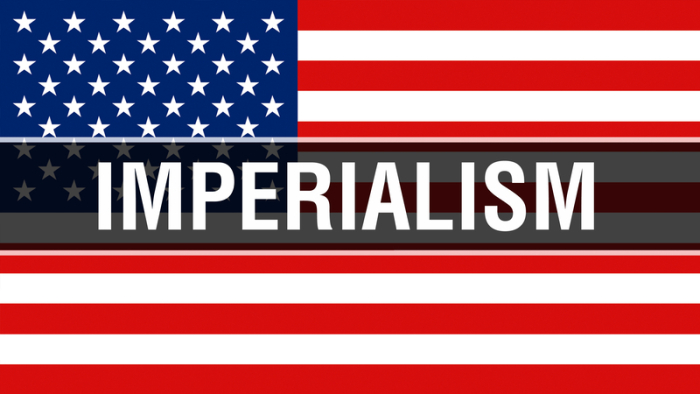

The term ‘Imperialism’ may be understood as the building of a global empire by modern states. It occurs in situations where the cultural, economic, and political spheres of a nation are dominated by a stronger nation. Europe practised this foreign policy.
Imperialism is not a recent phenomenon of the nineteenth century. It has dominated the world era from the sixteenth century. Under old imperialism, Europe sought successful trade ties with the Far East, exploring the New World and establishing settlements in North and South America, and also Southeast Asia.

The term ‘Age of Imperialism’ connotes the activities of ‘imperial nations’ like the United Kingdom, Japan, France, Germany, Italy, etc., in the 18th to 20th centuries. Through these centuries, the policy of imperialism came to be known as New Imperialism. It gained impetus from cultural, economic, humanitarian, military, political, and religious reasons, the development of ‘social Darwinism’, and the advancement of technology.
Trading ports were set up in Africa and Asia since the sixteenth century, However, the influence was not at its peak during this period. It was only during the Age of New Imperialism that vast European empires were set up in Africa Asia, and the Middle East, making imperialism a dominant ideology in the world domain.
The Dark continent remained unknown to the world until at least the late nineteenth century. The colonization process in Africa began with the British occupation of Egypt and further Belgium’s penetration of Congo. The purchase of the Suez Canal was a significant factor, for it enabled the British to establish a protectorate over Egypt. Imperialism in Africa brought economic prosperity to European nations, as the raw material and natural resources from Africa were valuable. This, in turn, had a devastating impact on the African economy and society.
By the end of the 1800s, most of Africa was controlled by the European imperial powers. This was called the Scramble for Africa. Initially, the European powers were actively engaged only in trading activities in Africa, specifically along the coast. But after the Scramble for Africa, Europeans now seized control over vast expanses of land throughout Africa and established a colonial government in the region.
The ‘Scramble for Africa’ left a legacy on the people of Africa which still exists today. The term ‘scramble’ here denotes how the European powers were competing to capture territory in Africa, to expand their respective empires. Britain, France, Germany, Belgium, Italy, Portugal, and Spain were the leading European imperial powers in Africa. What caused the scramble for Africa was not only the European competition, but also, ethnocentrism, innovations and advance in technology, and the spread of Christianity.
India − Like Africa, imperialism in Asia saw the entry of several European powers into the arena. Beginning with the Portuguese, the Dutch, the French, and finally the British began establishing colonies in Asia. Great Britain began forming economic relations with India in the seventeenth century. Further, by the eighteenth century, they were able to entrench the Indo-British relations in a neo-mercantile system, which also helped them in setting up triangular trade between India, China, and Great Britain.
China − The tea trade with China was one of the most significant trades of the 1800s. To cover up the depletion of their treasury, the British began importing Opium from its Crown Colony, India. The opium history is painted in red with blood. The Opium wars and the further unequal treaties were important in the advancement of imperialism. Many rebellions took place in China against imperialism, for example, Taiping Rebellion, Boxer Rebellion, etc.
Imperialism set foot in the Middle East in the 1800s. The prime reason for the entry of the European powers into the Middle East was the strategic location of the region, its waterways, and the availability of vast oil fields.
Imperialism divided the Middle East in this manner, where Great Britain controlled the Suez Canal. They also secured Iran, Kuwait, Qatar, Iraq, and Bahrain. Next, Russia gained control over the Dardanelles and helped to dismember the Ottoman Empire. Third, Germany established the Berlin-Bagdhad Railroad.
Economic exploitation
Destruction of the native culture and industry
Disruption of traditional political units
Tensions among the Western powers
The confrontation between the cultures
Racism
Positive consequences- social reforms, the spread of education, technological advancements
The Age of Imperialism is significant in world history, as it changed the world drastically during the nineteenth and twentieth centuries. Vast empires were set up across the world during this period, which began in the 1870s. Imperialism had complex consequences for Europe and the world. It contributed to bringing economic prosperity to Europe, but at the expense of the economies of other regions. However, it also had certain positive implications on the societal notions of the regions which were dominated.
Q1. What were the causes of Imperialism?
Ans. Imperialism had roots in industrialization which demanded raw materials and labour. Nationalism, the balance of power among neighbouring nations, and the white man’s burden of civilizing the heathen savages were the other major causes of Imperialism.
Q2. How are colonialism and imperialism different?
Ans. Under colonialism, one nation asserts complete control over the weaker nation, and under imperialism, the control is asserted in political and economic terms and may or may not be formal. Colonialism involves the establishment of a colony by a stronger nation.
Q3. Which Asian country escaped imperialism?
Ans. The only Asian country to have escaped imperialism in Japan. It moved on the same path of industrialization as Europe and the United States, became an imperial power and gained control over several regions in Asia.